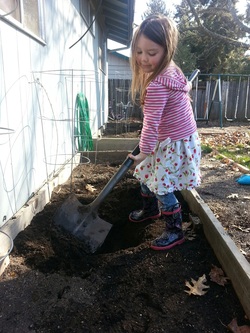Never give up. And most importantly, be true to yourself. Write from your heart, in your own voice,  A good friend, Laura LeHew, has a small poetry press, Uttered Chaos, based in Eugene, OR. She sent me her most recent publication, Turn, an anthology of poetry in which the months of the year are highlighted. I remember attending a critique group where we all admitted to having written "November poems." And these poems were moody, introspective. Were we reacting to the coming darkness, the anticipation of becoming more insular, more solitary? November's wistful poem is markedly different than May's exuberant one. Or the heat and humidity of an August poem, the weariness of continual sun and light. I am going to write a review of Turn, but here I am more interested in the larger story of how each voice in this book is (gratefully) unique. When we think we have to write like Billy Collins or Mary Oliver or Sylvia Plath, we've missed the point. We may be able to mimic style and voice to a degree, but we will never write their poems as well as they do. As I read Jane Hirshfield's poems the other day, I became envious; I wanted to write her poems. I wanted to capture what she'd captured in just the way she'd captured it. When I returned to the world of limitations and differences, I was grateful to this woman for giving so much of herself to poetry, for living such a particular life that whatever she writes is astoundingly unique. from "The Promise" by Jane Hirshfield Stay I said to my body. It sat as a dog does, obedient for a moment, soon starting to tremble. As writers, as poets, our need is to dig deeper into our November selves, to expose and turn over whatever we've buried, whatever asks for May's exposure. And when that material frightens us, and it will, we'll know it is the rich detritus of creation. This is what makes our poem our poem. No one else has this exact experience, the corresponding emotions, or the singular voice that only we possess. In reading through Turn, I could not choose one poem above another. But "November, Late" by Amy MacLennan, with its subtle grace, its forgetting of self, is my current favorite. The author is talking about losing someone, a final gift, but throughout the poem she works deftly with the image of leaves. from "Novemeber, Late," by Amy MacLennan Daylight will come back with new leaf folds on the tips of branches. I watch for them even now, even as the dying ones remain. Although I might have a similar experience, I could never have written this poem in this way, its inflections, its tone, belong solely to the poet. As I continue on through Turn, I am as excited to find differences, as well as similarities. Like the seasons, there is beauty in sparseness as well as in abundance, in the lyric as well as the narrative.
1 Comment
 Social media is a giant distraction to the ultimate aim, which is honing your craft as a songwriter. There are people who are exceptional at it, however, and if you can do both things, then that's fantastic, but if you are a writer, the time is better spent on a clever lyric than a clever tweet. Bryan Adams In a world of instant gratification through social media, at what point does this major distraction distract from the quality of our writing? Do we twitter, pinterest, facebook and ning our way through the day, or do we use these communication tools to occasionally make contact with the people we care about? Should we, as writers and creatives, be even more concerned about the effect of constant and easy communication? And if we are adding to the overall online noise, what is the quality of that noise? A few years back, the word "platform" became the new obsession for writers. You didn't even need a completed manuscript, you were encouraged to build your platform, and then you could worry about what you were offering the world. Who you were, or made yourself appear to be, was the selling point, not what you wrote, or even how well you wrote it. It seemed absurd to me, a kind of backwards approach to creativity. Get an audience and then create something! The only way this approach is valid is if the end product of creativity is just that, a product. We can argue that of course a painting or a book, a Florence + the Machine CD or a well-crafted bentwood rocker is a product. Yet doesn't the quality of the commodity matter more than how much attention it receives? If 200 people "like" something on facebook, does that make it more viable? What frightens me is that we might lose the deep contemplative selves that need quiet rooms, disconnection from electronics, and large swaths of time in order to have thoughts worthwhile enough to share. If our communications become primarily superficial, where in this electronic rabbit's hole is there room for empathy, for compassion? Not only do these distractions detract from our ability to create freely and wildly, they ironically distance us from one another. Are we short-circuiting our adult brains, just like kids parked in front of Sesame Street? No one questions PBS-wisdom, when the early childhood experts explain that children have short attention spans, and shooting images and words and bright characters at them is the best way to program their malleable brains. We might ask those experts if learning how the adult world works in slow, boring time isn't a better preparation for living in the adult world. Sesame Street to twitter is not a big leap. We adults build our web sites, create blogs, such as this one, and maybe we even have followers on the quick and dirty sites. Our every thought broadcast for others to consider. But what of the content? Can we in 140 characters communicate any more than self-interest? Do we touch or help or change one another's lives by posting the meal we just ate or the hand bag we just bought? Do you really care if I did 50 reps per arm at the gym? Okay, 30. I recently opted out of facebook. I assumed my adult children would eventually call me, my friends too when they figured out I'd gone missing. As for the dozens of new "friends" I'd befriended, they would not truly miss someone they'd never met face to face. I'll maintain this site and my business site . . . and I'll communicate more intimately with people. I'll call them or email them or write them a letter. People still do that, right? As writers, we know what it takes to create our best work . . . each of us having a different set of quirky needs and habits. I found early on that I could not have music playing while I wrote, the lyrics kept me from deep concentration. Discovering that social media, as seductive as it is, has the same effect on me, it makes sense to walk away. I may not be following the populace, and the populace is definitely not following me, but if you and I pass on the street, recognize one another and embrace in friendship, that is enough of a platform for me. |
Archives
October 2022
AuthorMy writing often deals with the environment, my poetry filled with allusions to natural and man-made disasters. I have unlimited hope though; there is just too much wonder in this world to become a defeatist. To quote Margaret J. Wheatley, '"Hopelessness has surprised me with patience." Categories |
 RSS Feed
RSS Feed
